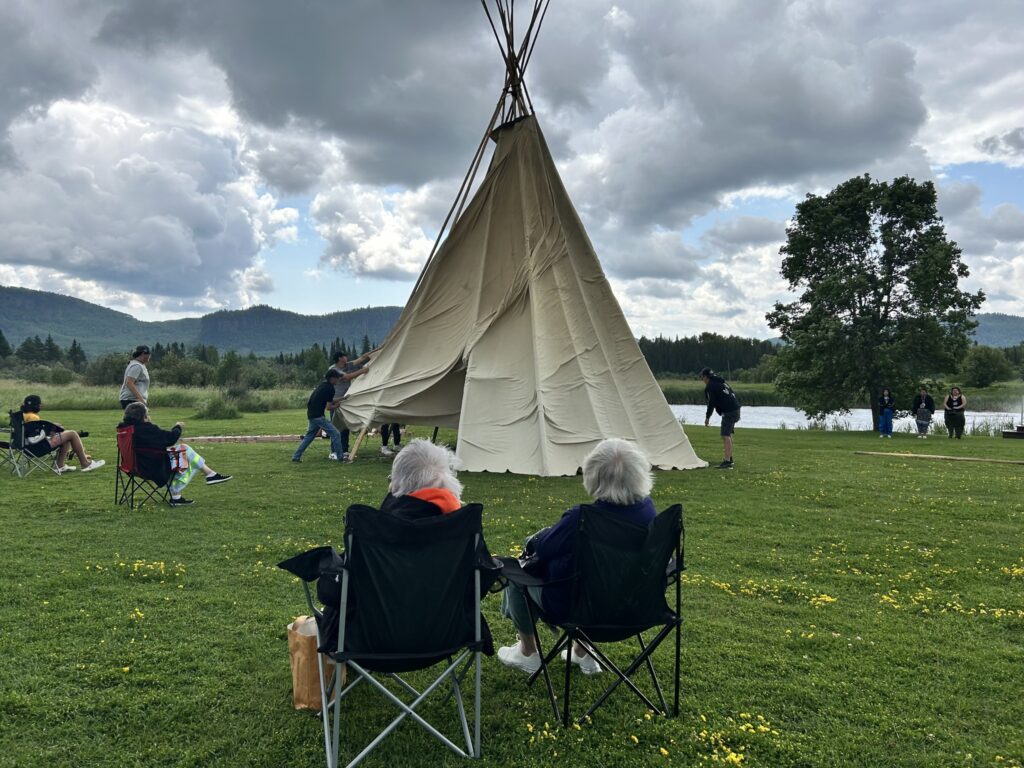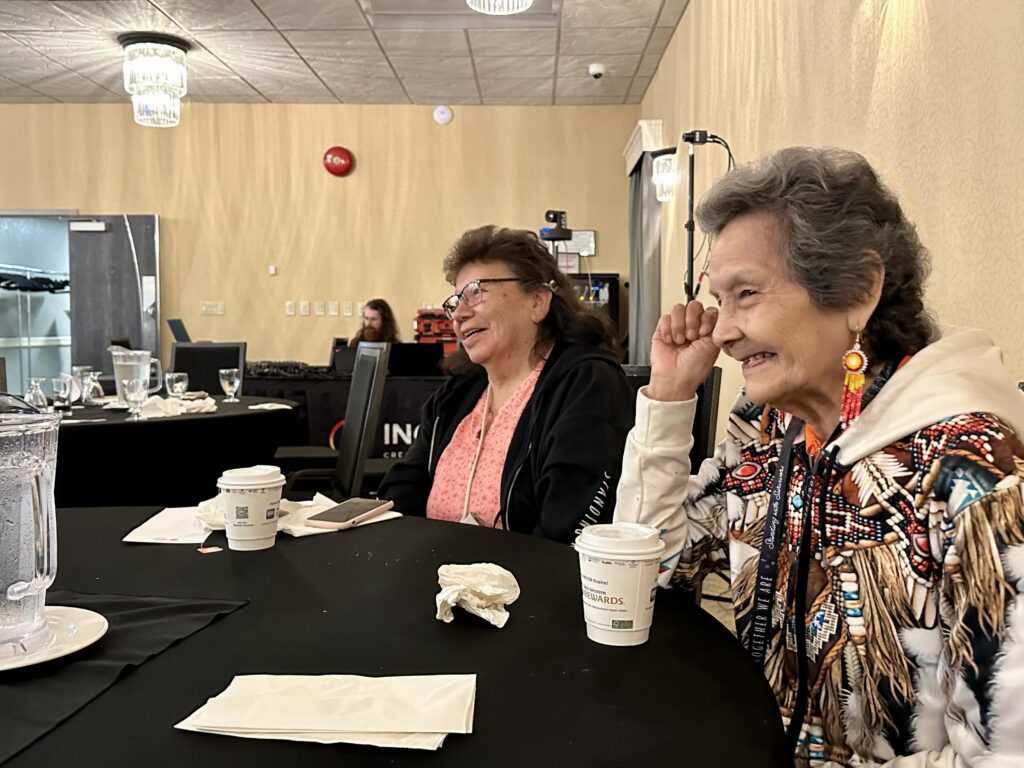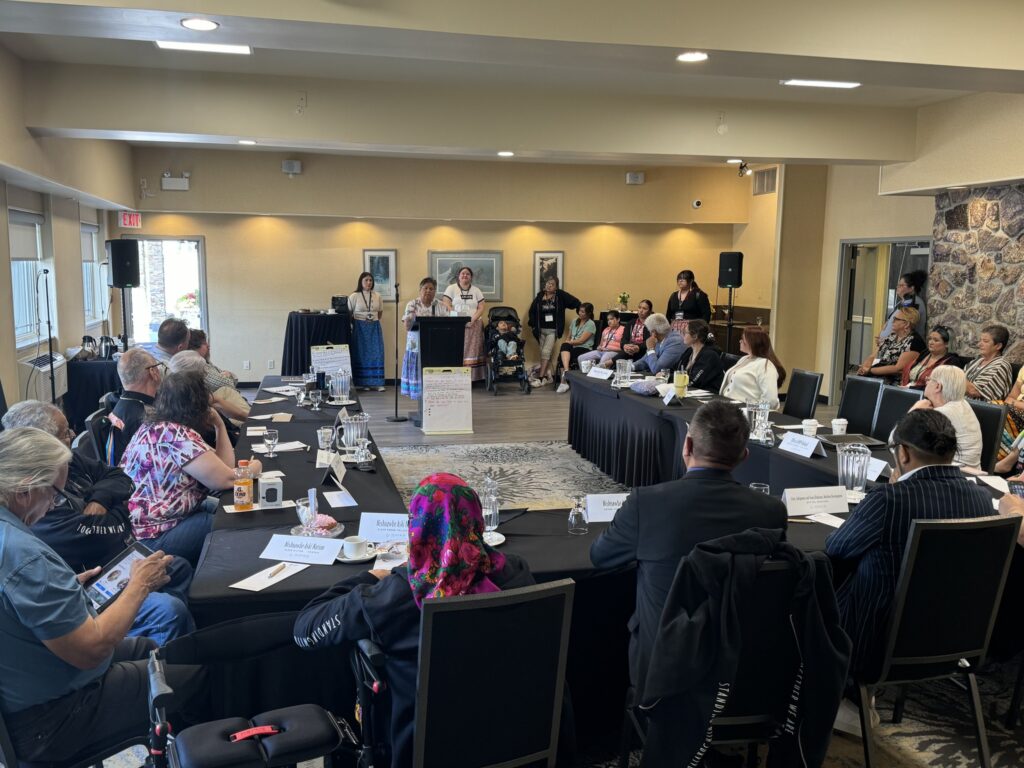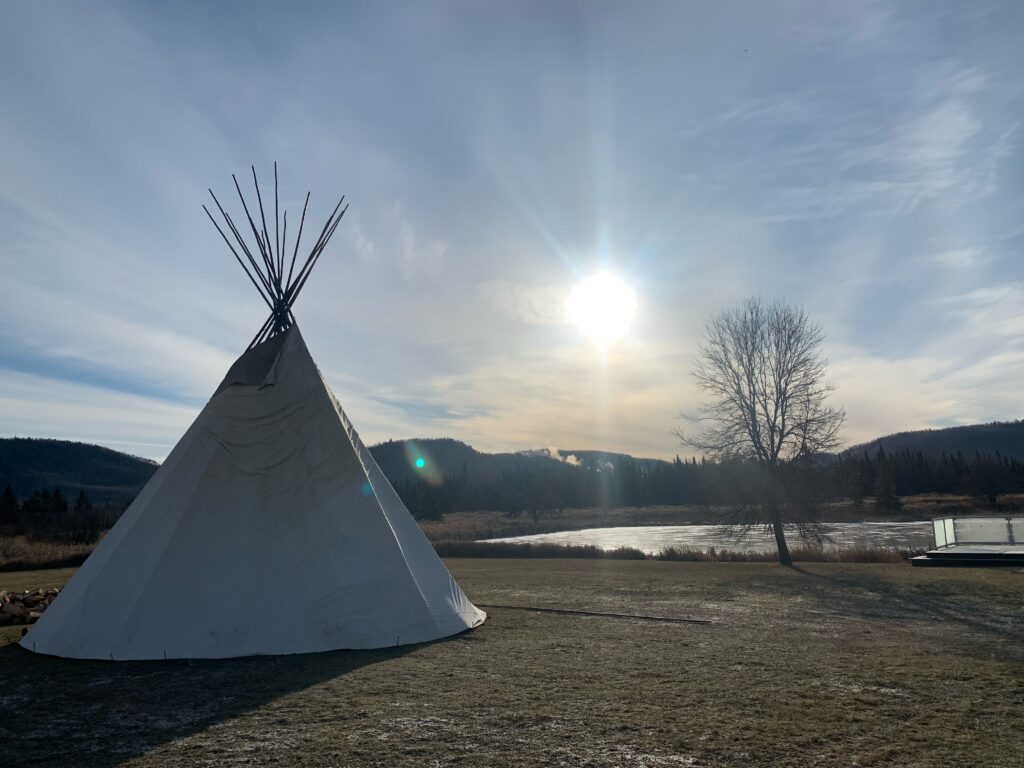From July 15– 19, 2024, Survivors and First Nations youth gathered on the traditional lands of the Fort William First Nation in Thunder Bay, Ontario, for the Together We Are Standing with Survivors Gathering.
The gathering was designed to foster a community space and dialogue between Indigenous youth and Indian Residential School Survivors. Survivors hope that by sharing their lived experiences the youth will gain insight into the ongoing trauma in Indigenous communities. Survivors also want the youth to embrace their roles as knowledge carriers, conveying the truth about what happened at the Indian Residential Schools to others.
The Indigenous youth attending this gathering were eager to contribute to their role as helpers. They want to support Survivors and play an active role in telling the truth and advancing the healing process.
Through dialogue, Survivors can observe the understanding and willingness to help from the young generations. In turn, the youth gain insight into the Survivors’ experiences and recognize the challenges they have faced. By standing with Survivors, the youth aim to be an integral part of this important journey.
“I’m so impressed with our youth today, I’m amazed they are that strong”– Dawn Hill, Survivors’ Secretariat Board Member
Hosted in partnership with the Survivors’ Secretariat, Feathers of Hope, Nishnawbe Aski Nation, and Anishinabek Nation, the event reflected a shared commitment to honour the truth of the Survivors’ lived experiences who have courageously lived through the legacy of the Indian Residential School system. Daily, youth and Survivors participated in discussions, workshops, and ceremonies together.

The morning featured the traditional raising of a teepee by the youth, a practice deeply rooted in Anishinaabe culture. This hands-on activity was not only an opportunity to learn traditional practices but also provided an opportunity to connect with our ancestors while reinforcing the beauty of our cultural identity. By participating in this tradition, the youth embraced their roles as knowledge carriers, leaders and stewards of Indigenous culture.
We were honoured to hear from Darrell Boissoneau, a former Chief of the Garden River First Nation and a dedicated advocate for cultural-based education and the preservation of Anishinaabe traditions.
Darrell spoke about the importance of seeking mentorship to develop skills and gifts. He encouraged Indigenous youth to seek advice, guidance, and direction while honouring and respecting their elders. “Know who you are, know your history, and the paths that your family and ancestors have trailblazed for you,” he advised. His reflections on his involvement with various Indigenous social movements underscored the role these experiences played in shaping his identity and commitment to justice and peace. “Don’t be scared to stand up. Don’t be scared to use your voice,” he urged.
Later in the day, Samantha McKenzie, a keynote speaker, shared a personal story of perseverance and achievement. Her journey to earn her high school diploma served as a testament to the importance of pursuing one’s dreams despite obstacles. McKenzie’s words “Great minds can do great things. Dreams mean everything”—inspired both Survivors and youth, reinforcing the belief that with determination, anything is possible and it’s never too late to chase one’s dreams.
As the Gathering continued into Day 2, the focus shifted to sharing insights and advocating for crucial changes. The Survivors’ Secretariat youth ground search team presented reflections and the “what we heard report” from the Third Annual Survivors of the Mohawk Institute Gathering held in Brantford, Ontario this past June.
Key highlights included:
- Ground Search Efforts: Survivors emphasized halting construction to respect burial sites on the grounds of the Mohawk Institute. There was also an emphasis on the importance of conducting ceremonies to honour and bring peace to the spirits of those buried.
- Cultural Protocols and Respect: There was a strong focus on the diversity of healing approaches and the importance of engaging with other nations. Recognizing the variety of cultural protocols among different Indigenous nations was considered essential for fostering respectful collaboration and solidarity.
- Honouring Children’s Dignity: Survivors expressed the need to honour missing children from the Mohawk Institute with annual gatherings and social events addressing intergenerational trauma within Indigenous communities.
- Changing Landscapes: Survivors noted significant transformations on the lands of the Mohawk Institute. Insights were shared into these evolving areas, including the repurposing of buildings.
- Data Sovereignty: Survivors voiced the importance of releasing names to communities and families first and expressed the need for family or community members to have access to this data indefinitely.
These discussions were vital in shaping our collective understanding and action plans, emphasizing the need for continued advocacy and support for affected communities.
Sean Morriseau, also known professionally as Native Pool Boy from Fort William First Nation, led a dynamic workshop on boosting confidence and empowering participants to communicate effectively with audiences. Sean’s session encouraged everyone to embrace their true selves and highlighted the transformative power of self-confidence.
“Confidence is a Superpower,” - Sean Morriseau
He shared a traditional teaching that links trees to personal growth, demonstrating how confidence can nurture and expand one’s potential. Participants took part in practical exercises aimed at enhancing self-awareness and fostering positive self-reflection. In the evening, Sean hosted a comedy show that created a lighthearted and uplifting atmosphere, evident from the laughter and smiles of the enthusiastic audience.

The final day of the gathering was marked by significant reflections and forward-looking discussions. The Youth and Survivors presented their findings and recommendations to an audience that included local and regional First Nation leaders, representatives from the Thunderbay area and the province of Ontario. These presentations reflected the insights gained from two days of dialogue and workshops, highlighted critical issues such as:
- Advocacy for increased funding or in-kind contributions
- Current challenges with addictions in Indigenous communities
- Importance of Language Immersion Programs and Land-based learning
- Mentorship and leadership opportunities for Indigenous youth
- Collaborative efforts on organizing inter-generational trauma initiatives to further support communities.
- A change in the current education systems to include teachings on First Nations history and the history of Indian Residential Schools.
- The acknowledgement and honouring of the treaty agreements that were made by our grandmothers and grandfathers.
- Calls for political advocacy on Indigenous issues

Participants emphasized the need for annual gatherings to address intergenerational trauma and to advocate for the impacts and education of Indian Residential Schools, ensuring that communities have access to information and the funding needed to continue this vital work.
The gathering concluded with a traditional round dance, symbolizing the strength and unity of the community. This final event was a powerful affirmation of the collective resilience and shared heritage of the participants.
About Feathers of Hope
Feathers of Hope, an Indigenous youth-led charitable organization, played a crucial role in the success of this gathering. Thier mission is to mobilize the energies and passions of Indigenous young people to foster collaborative partnerships that ensure their active role in building healthier and safer communities. By empowering Indigenous youth, Feathers of Hope seeks to create pathways for leadership and engagement, driving positive change and resilience within our communities.
Together We Are Standing With Survivors
The Together We Are Standing With Survivors Gathering is a first step in cross generational healing. As Laura Arndt from the Survivors’ Secretariat aptly noted, “Across our nations, we are a family.” This gathering demonstrated the power of unity and shared purpose in driving positive change.
Survivors’ Secretariat extends our heartfelt gratitude to all organizers and participants. Your involvement and insights have made this gathering an inspiring experience, reinforcing our collective resolve to build a future grounded in resilience, healing, and hope.
